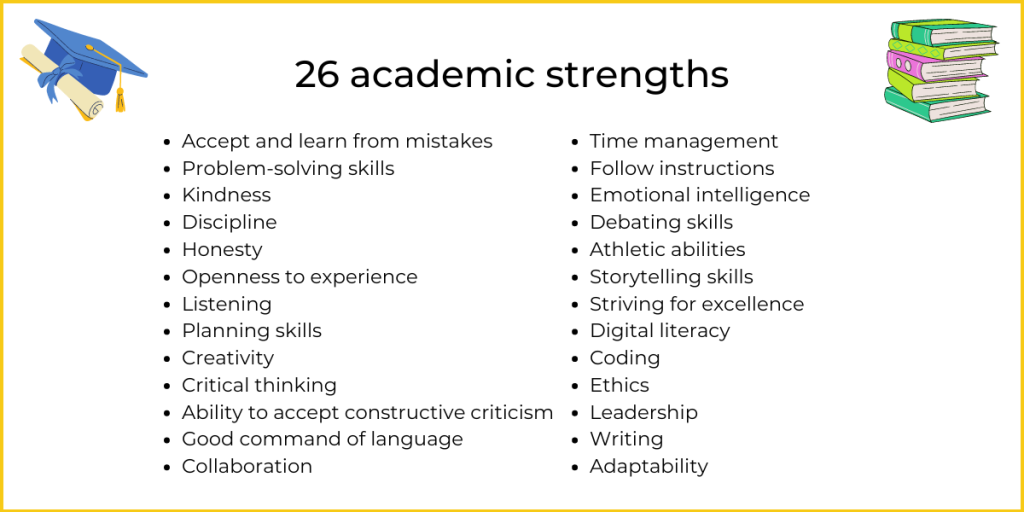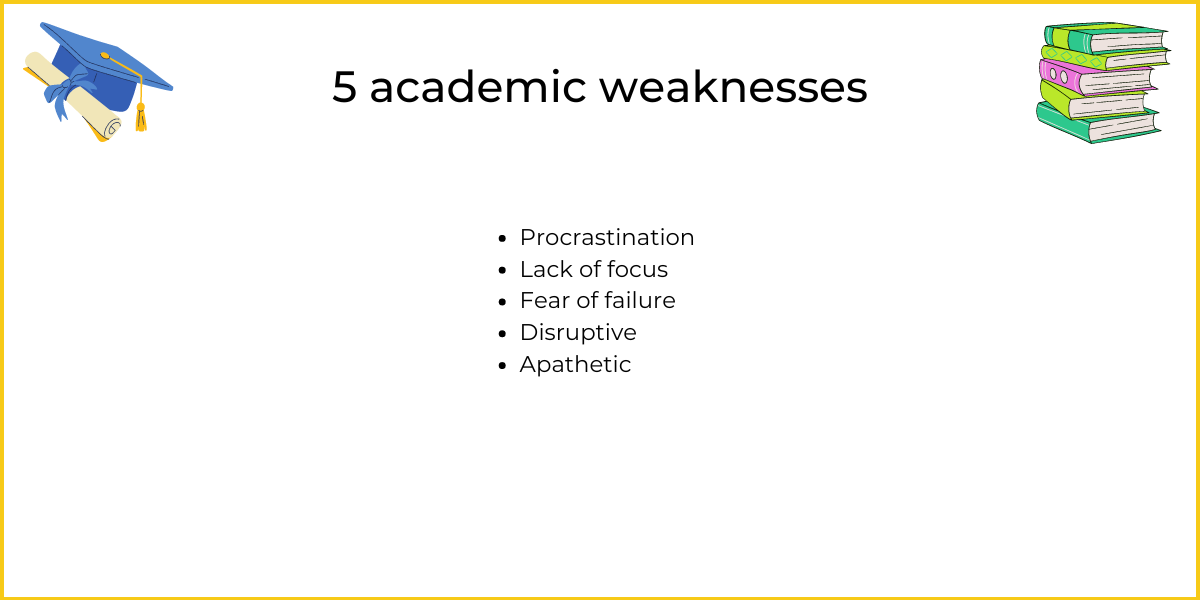As a prospective student, choosing a college or university is an important decision and a big step toward your future. Many students rely on an excellent academic application to get into their dream college or university, but that might not be feasible for all. Having specific talents and academic strengths identified through tools like the HIGH5 strengths test, along with your extracurricular activities or volunteer efforts, can significantly enhance your college application, ultimately helping you to stand out among other applicants.
Understanding which talents and strengths to highlight on your application will help you get into your ideal college and on your path toward success. In this article, we will go through what constitutes academic strengths and weaknesses. Additionally, we will provide a list of academic strengths and weaknesses for your reference. Lastly, you will learn how to identify and develop your academic strengths.
Pro Tip From HIGH5
Before you submit your college application, take the HIGH5 strengths test to identify your key strengths. Use the detailed report to pinpoint which strengths to highlight in your application essays and interviews, ensuring you present yourself as a well-rounded and capable candidate.
What are academic strengths?
Academic strengths are talents, abilities, or skills that give students a solid foundation for academic success. Academic strengths are innate and will manifest themselves when you demonstrate your competence in a particular learning topic. Your academic strengths can be highlighted during college or university admission applications in order to catch the eye of those reviewing applications. These strengths allow you to stand out among the many applicants. Your strengths also enable you to show your competencies as a successful student and learner.
Having the right talents and traits can help you attract the attention of the admission staff. Your academic results, coupled with your extracurricular achievements and accolades, as well as your academic strengths may help you get accepted to your top-choice college. Now, let’s identify some examples of academic strengths:
20 examples of academic strengths
- Growth Mindset
- Problem-solving skills
- Kindness
- Discipline
- Honesty
- Open-minded
- Listening
- Organizational skills
- Creativity
- Critical thinking
- Receptive to feedback and criticism
- Collaboration
- Time management
- Emotional intelligence
- Communication
- Striving for excellence
- Ethical
- Leadership
- Academic Writing
- Adaptability
Growth mindset
Having a growth mindset where you can accept and learn from mistakes is a crucial academic strength, ultimately setting the foundation for lifelong learning and personal growth. This characteristic enables individuals to view failures not as setbacks but as opportunities for improvement. It fosters a resilient mindset that encourages experimentation, understanding that each error provides valuable insights.
By openly acknowledging and learning from mistakes, students and professionals can develop more effective strategies and enhance their problem-solving skills, achieving better outcomes in both academic and real-world scenarios. Utilizing the HIGH5 strengths test can significantly enhance an individual’s understanding of their natural talents, including rebounding from setbacks. By identifying resilience-related strengths, such as ‘Philomath’ or ‘Believer,’ individuals can better leverage these traits to transform mistakes into learning opportunities.
Problem-solving skills
Problem-solving skills are vital in academia and beyond, as they require individuals to evaluate complex situations critically, identify obstacles, and develop innovative solutions. These abilities build on analytical thinking, logical reasoning, and creativity to overcome challenges. Moreover, problem-solving skills also incorporate the ability to think on one’s feet and make quick decisions under pressure. This is a highly sought-after skill in the workforce, enabling individuals to handle unexpected situations and take calculated risks confidently.
Kindness
Kindness and empathy are essential strengths that contribute to building a positive learning environment and strong relationships with others. These qualities involve understanding, respecting, and valuing the thoughts and feelings of others, even if they differ from our own. In academia, kindness and empathy can help individuals collaborate effectively with peers, build supportive networks, and communicate ideas. Learning this skill in an academic environment can ensure you’re prepared for the professional setting where these qualities help individuals work well in teams, resolve conflicts, and establish trust with colleagues and clients.
Discipline
Discipline is a foundational quality that underpins success in both academic and professional realms. It involves the self-control to maintain focus on goals, adhere to a structured plan, and consistently work toward achieving objectives despite challenges or distractions. Effective discipline translates into meeting deadlines, maintaining a strong work ethic, and exhibiting persistence in the face of adversity. In your academic career, the ability to maintain disciplined effort over a long period of time is what separates success from failure [1].
Honesty
Honesty is a core value that fosters trust and integrity in all forms of communication and interaction. It underscores the importance of originality and the ethical conduct of research, scholarship, and many others in academic settings. Professionally, honesty cultivates a culture of transparency and accountability, which is essential for building lasting relationships and ensuring fair practices.
Open-minded
Being open-minded is a willingness to learn and immerse oneself in new experiences, which is extremely crucial for personal and professional development and success. This quality enhances cognitive flexibility and prepares individuals to adapt to changes and advancements in their field. It fosters a growth mindset, enabling people to view challenges as opportunities to expand their knowledge and skills.
Pro Tip From HIGH5
HIGH5 recommends regularly revisiting and reevaluating your strengths as you encounter new experiences and challenges. This ongoing reflection ensures you consistently align your growth and learning opportunities with your evolving strengths profile.
Listening
Effective listening is vital for understanding complex concepts, following instructions accurately, and empathizing with others. It enables individuals to absorb, process, and respond to information appropriately, facilitating better communication and collaboration in both academic and professional settings.
Organizational skills
Strong organizational skills are instrumental in setting realistic goals, planning activities efficiently, and managing time effectively. They allow individuals to anticipate potential obstacles, allocate resources wisely, and stay on track to achieve desired outcomes.
Creativity
Creativity is thinking outside the box and generating innovative ideas or solutions. In academia, it drives research and the development of new theories, while in the professional world, it leads to the creation of novel products, strategies, and approaches to problem-solving. It’s important to learn to love the process and let whatever happens in the creative process happen without worrying about it [2].
Critical thinking
Critical thinking involves analyzing information objectively, evaluating evidence systematically, and making reasoned judgments. This skill is invaluable for navigating complex issues, making informed decisions, and developing persuasive arguments in scholarly and professional contexts.
Receptive to feedback and criticism
The receptiveness to constructive criticism is essential for continuous improvement and learning. It involves recognizing feedback as a tool for personal and professional growth, allowing individuals to refine their skills, enhance their performance, and adapt their approaches to meet high standards of excellence. Moreover, it’s key while in the academic setting to learn from professors, upper-classmen, colleagues, and fellow students to gain their wisdom and insight on feedback and how to improve.
Collaboration
The art of collaboration involves working cohesively with others to achieve common goals. It requires open communication, mutual respect, and a willingness to share ideas and resources, vital for success in team-based projects and environments.
Time management
Effective time management allows individuals to prioritize tasks, work more efficiently, and meet deadlines. It involves planning, organizing, and allocating time to activities according to their importance, which is critical for productivity and stress reduction. This skill is crucial for the academic setting.
Emotional intelligence
Emotional intelligence is the capacity to be aware of, control, and express one’s emotions judiciously and empathetically. It plays a crucial role in building and maintaining interpersonal relationships, as well as in personal development and leadership.
Communication skills
Communication skills involve conveying messages, emotions, and information through compelling narratives, speeches, or informal channels. A strong command of language is crucial for effective communication, enabling individuals to articulate thoughts clearly and convey complex ideas succinctly. It enhances the ability to persuade, inform, and engage audiences in various contexts. Moreover, skills such as debating encompass the ability to present arguments coherently and persuasively while also critically evaluating the arguments of others. These skills are vital for effective communication, problem-solving, and critical thinking.
Striving for excellence
Striving for excellence is continually pursuing higher standards and quality in work or activities. It involves dedication, resilience, and a commitment to continuous improvement and innovation. At times, this trait can be confused with perfectionism. It’s important to understand the distinction because perfectionism and striving for excellence are not mutually exclusive. Perfectionism is not about striving for healthy achievement and growth [3].
Ethics
Ethics involves understanding and applying principles of right and wrong in decision-making processes. It is critical for maintaining integrity, trust, and professionalism in academic, personal, and professional contexts.
Leadership
Leadership involves guiding, inspiring, and motivating others to achieve common goals. It requires vision, communication skills, emotional intelligence, and the ability to make decisions and solve problems effectively. While many think that there are not opportunities for leadership in the academic space, there will be plenty of opportunities to show leadership skills.
Academic writing
Writing encompasses expressing ideas, conveying information, and communicating effectively through written text. It is fundamental for academic success, professional development, and personal expression.
Adaptability
Adaptability is the ability to adjust to new conditions, challenges, and opportunities. It involves being flexible, resilient, and open to change, which is crucial in a rapidly evolving world.

Pro Tip From HIGH5
HIGH5 recommends regularly revisiting and reevaluating your strengths as you encounter new experiences and challenges. This ongoing reflection ensures you consistently align your growth and learning opportunities with your evolving strengths profile.
How do I identify my academic strengths?
Take a strengths test
Taking a strengths test is crucial in understanding your unique capabilities and academic strengths. The HIGH5 test, specifically designed to uncover your top five strengths, provides detailed explanations that are invaluable for academic and personal development. Over 25 million strengths have been identified using our test, helping students like you make informed decisions about their future. Try it now for free.
Pro Tip From HIGH5
Moreover, you can utilize the insights from your HIGH5 test results to engage in targeted academic activities. For example, if your results highlight ‘Critical Thinking’ as a strength, participate in debate clubs or critical writing workshops to further hone this skill.
Ask and collect feedback from others
You can also consider obtaining feedback from lecturers, parents, or close friends. Sometimes, they may know your strengths and talents more than you do. They can give you valuable feedback on areas that you may not have noticed. Alternatively, you can also recruit their help to go through your list of strengths to verify your self-identified strengths.
Evaluate your decisions
Taking time to analyze how you make decisions can help you identify your strengths and weaknesses. Some people make decisions based on reasoning, while others make decisions based on emotion or personal feelings. Consider the last expensive purchase or difficult decision you had to make. Did you make the decisions based on your reasoning or emotion? Understanding your preferred style can help you better understand your natural decision-making inclinations and let you make the most of them.
Assess your organizational style
Other than your decision-making process, your organizational style can also reveal more about your strengths. You may be someone who prefers a structured way of doing things or flexibility where you go with the flow. If you are someone who gets stressed when there’s no plan, then organizational skills could be one of your strengths. But, if having a structured plan makes you stressed, then flexibility could be one of your strengths. You might be more adaptable to change and are willing to go with the flow.
Tips for managing academic strengths
Recognizing your strengths through assessments like the HIGH5 test is vital for enhancing your academic performance. Accurately identifying these strengths allows you to strategically leverage them, increasing your effectiveness and success in academic pursuits. The advantages of identifying your strengths will be well worth the time and effort you invested. Moreover, students should consider activities outside of school that help them grow intellectually while developing their strengths.
Here are some activities aimed at pursuing enrichment through other means:
- Music, drama, or art
- Academics, such as academic clubs
- Athletics
- Theater
- Social justice
- Cultural activities
- Interest clubs
- Volunteering
- Internships
Pro Tip From HIGH5
After identifying your strengths with the HIGH5 test, create a personal development plan that focuses on these strengths. Set specific goals for each semester to develop these strengths, such as joining specific clubs, taking leadership roles, or engaging in community service that aligns with your strengths.
How to answer an interview question: “What are your academic strengths?”
Your greatest strength may be a necessary skill for the role in which you are applying. Your strengths are also what distinguishes you from other candidates. In general, you can choose between skills/habits and personality traits when highlighting your academic strengths. Use the same combination of your strength + context + story to highlight your strengths. Depending on your experience and skills, you may want to adapt your strength selections and responses.
You may refer to the suggestions below when crafting your script:
- Do not make a long list of strengths that are all over the place. Focus on one or two essential qualities directly related to your application, and back them up with specific examples.
- Do not exaggerate or lie about your strengths when answering such questions. But don’t be too humble because you want to show your best qualities to your interviewers.
- Find a skill in the job description that you exhibit and utilize that as your strength.
The importance of analyzing academic strengths and weaknesses
Having a deep understanding of strengths and weaknesses will assist students in discovering how to excel in school. It will also aid in developing a sense of self-awareness as they become more acquainted with how and when they can utilize their skills. Once they realize what they are excellent at, they will devote more attention to honing their skills. Then, instead of being held back by problems, the students will see every opportunity as a chance to develop and grow.
By focusing on their strengths, students will slowly develop confidence and passion, which will lead to improved academic grades over time. As their ability to manage their strengths grows, they will also gradually overcome some of their weaknesses.
What are academic weaknesses?
Nobody is perfect. We all have our strengths and weaknesses. Academic weaknesses are the drawbacks you encounter in a learning environment. Similar to academic strengths, your academic weaknesses can come from your skills, personality traits, or talents. These weaknesses are usually identified as part of the college or university admission process. Or, they can also be used for your personal development.
5 examples of academic weaknesses
- Procrastination
- Lack of Focus
- Fear of failure
- Disruptive
- Apathetic

Procrastination
Every student’s academic career is affected by procrastination. Procrastination is the deliberate postponing of one’s assignments until the last possible moment. It adds to their workload and causes them to get stressed when they can’t complete their tasks correctly. An example of procrastination is a student who spends hours playing computer games before doing their school assignment. A student procrastinates studying for an upcoming exam by doing unimportant things such as cleaning their room or watching TV.
Lack of focus
When students have a short attention span, they are unable to focus on the work at hand. They may be easily distracted by their surrounding environment. Examples of this weakness are zoning out in class, losing attention through neglecting to do homework, oversleeping, or focusing on partying rather than studying.
Fear of failure
On top of their overwhelming academic workloads, students have to deal with their parents’ (or other individuals’) expectations. As a result, students are afraid of failing academically and disappointing their parents. Ironically, their fear of failure is what causes them to perform poorly when it matters.
Disruptive
Disruptive students can hamper their success as well as other students’ concentration in class. Interestingly, students who behave this way might signal that something deeper is going on. Students who are disruptive should address the root cause in order to fix it long-term [4].
Apathetic
Apathetic students tend not to see the value of studying and learning. They find it challenging to invest time and effort to achieve good academic results. As a result, they rarely enjoy their time in school, and their opportunities later in life may be limited.
How to help students understand their academic strengths?
The real work begins after the students have identified their academic strengths and weaknesses.
After identifying them you can work closely with the students to determine how these strengths and weaknesses may affect their academic progress and then build a plan to assist. By conducting an honest self-evaluation, students will be able to prioritize and plan their personal development plan. It is recommended that they concentrate on one area at a time. They should avoid focusing on developing all their strengths and weaknesses at the same time.
You can ask students to start by making a list of their academic strengths, with their preferred strengths at the top. The list they developed will provide them with a clear understanding of their top strengths.
Remind them that it’s easy to discount a particular skill when it doesn’t seem to relate to the present situation. But this isn’t always the case. With the list, they can easily recall their strengths even while working on a seemingly unrelated task.
How to help students understand their academic weaknesses?
Let the students know that recognizing their academic strengths is only half the battle. The other half is having awareness of their academic weaknesses. By recognizing their weaknesses, the students can understand how their weaknesses might affect them when completing assignments, interacting with other students, or just being generally successful in the academic setting.
Similar to listing their academic strengths, you can ask the students to document their academic weaknesses. A key point here is always to be honest and truthful when assessing their shortcomings.
Assist them in understanding that their weaknesses will not prohibit them from achieving academic success. They are just minor hurdles that can be overcome with perseverance.
Help them to understand that everyone has flaws and limitations and it’s key to have a holistic understanding and awareness to foster personal and professional growth. Eventually, with a well-structured personalized development plan, they may even transform their weaknesses into strengths.
Academic strengths & weaknesses FAQ
What are some greatest academic strengths?
There are a plethora of academic strengths that you could obtain. However, some strengths are more in demand and crucial than others, especially when it comes to academics. Some of the greatest academic strengths include: learning from mistakes, honesty, integrity, responsibility, commitment, time management, kindness, problem-solving, openness, and creativity.
What is your main academic strength?
You can find your main academic strength by taking an academic strengths assessment. You will be asked several questions in order to gain insight, but it’s vital to answer honestly. Once complete, a strength report is generated. Alternatively, you could ask some of your professors and teachers about your strengths. Moreover, consider some of your greatest academic successes. Write down which strength helped you achieve each and try noticing patterns. These patterns will reveal your academic strengths.
What are some strengths of a student?
There are many strengths that a student could possess, and the strength profile of every student is different. For example, concert masters and sports team leaders likely have excellent leadership and communication skills. Someone who commits to studying every night has time management skills. Another student who focuses on debate club or Model UN could have public speaking skills.
References
- Duckworth, A. (2016). Grit: The Power of Passion and Perseverance. Scribner.
- Gilbert, E. (2015). Big Magic: Creative Living Beyond Fear. Riverhead Books.
- Brown, B. (2012). Daring Greatly: How the Courage to Be Vulnerable Transforms the Way We Live, Love, Parent, and Lead. Gotham Books.
- Goleman, D. (1998). Working with Emotional Intelligence. Bantam Books.














